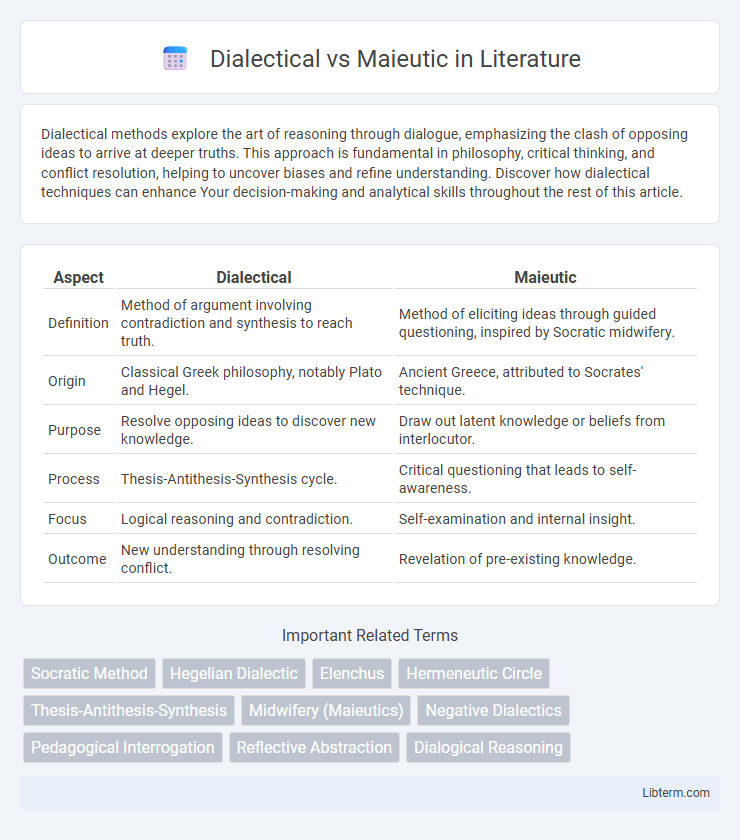Dialectical methods explore the art of reasoning through dialogue, emphasizing the clash of opposing ideas to arrive at deeper truths. This approach is fundamental in philosophy, critical thinking, and conflict resolution, helping to uncover biases and refine understanding. Discover how dialectical techniques can enhance Your decision-making and analytical skills throughout the rest of this article.
Table of Comparison
| Aspect | Dialectical | Maieutic |
|---|---|---|
| Definition | Method of argument involving contradiction and synthesis to reach truth. | Method of eliciting ideas through guided questioning, inspired by Socratic midwifery. |
| Origin | Classical Greek philosophy, notably Plato and Hegel. | Ancient Greece, attributed to Socrates' technique. |
| Purpose | Resolve opposing ideas to discover new knowledge. | Draw out latent knowledge or beliefs from interlocutor. |
| Process | Thesis-Antithesis-Synthesis cycle. | Critical questioning that leads to self-awareness. |
| Focus | Logical reasoning and contradiction. | Self-examination and internal insight. |
| Outcome | New understanding through resolving conflict. | Revelation of pre-existing knowledge. |
Understanding Dialectical and Maieutic Methods
Dialectical method involves structured dialogue where opposing ideas are debated to reach a synthesis or truth, emphasizing critical reasoning and logical progression. Maieutic method, rooted in Socratic philosophy, employs guided questioning to help individuals uncover inherent knowledge or insights through introspection. Understanding these methods highlights dialectical's focus on external argumentation versus maieutic's emphasis on internal discovery.
Historical Origins of Dialectics and Maieutics
Dialectics originated in ancient Greece with philosophers like Heraclitus and was systematically developed by Socrates and Plato as a method of dialogue to explore contradictions and arrive at truth through logical argumentation. Maieutics, specifically attributed to Socrates, derives from the Greek word for midwifery, emphasizing a technique of drawing out knowledge by asking probing questions to stimulate critical thinking and self-discovery. While dialectics centers on resolving contradictions through reasoned discourse, maieutics focuses on facilitating personal insight and internalizing understanding through guided questioning.
Core Principles of the Dialectical Approach
The dialectical approach centers on the dynamic interplay of opposing ideas, emphasizing contradiction and synthesis as fundamental processes in knowledge development. It involves critical dialogue where thesis and antithesis conflict, leading to a higher level of understanding or a new synthesis that resolves tensions. This method prioritizes transformation through continuous questioning and reevaluation of assumptions within social, philosophical, or psychological contexts.
Defining the Maieutic Method
The Maieutic method, rooted in Socratic philosophy, emphasizes eliciting knowledge through guided questioning that helps individuals uncover latent ideas and truths within themselves. Unlike the Dialectical method, which involves argumentative dialogue to resolve contradictions and reach consensus, the Maieutic approach prioritizes introspective self-discovery and cognitive awakening. This method fosters critical thinking by enabling learners to actively participate in constructing their understanding rather than passively receiving information.
Key Differences Between Dialectical and Maieutic Techniques
Dialectical techniques involve structured argumentation to resolve contradictions through thesis, antithesis, and synthesis, fostering critical thinking by challenging assumptions. Maieutic methods, derived from Socratic questioning, aim to draw out latent knowledge by guiding individuals to self-discovery and insight through iterative questioning. The key difference lies in dialectical emphasis on conflict resolution and synthesis, whereas maieutic focuses on eliciting internal understanding without explicit debate.
Philosophical Influences on Dialectics and Maieutics
Dialectical method, rooted in Hegelian and Socratic traditions, focuses on resolving contradictions through thesis, antithesis, and synthesis, influencing modern philosophy and critical theory. Maieutic method, derived from Socrates' approach, emphasizes eliciting innate knowledge through probing questions, shaping constructivist and educational philosophies. These philosophical influences highlight dialectics as a process of knowledge evolution, while maieutics centers on self-discovery and internal cognitive development.
Application of Dialectical Method in Modern Discourse
The dialectical method, rooted in Hegelian philosophy, is widely applied in modern discourse to facilitate critical thinking and resolve contradictions within debates, emphasizing thesis-antithesis-synthesis progression. It is instrumental in academic, political, and social discussions by encouraging the clash of opposing ideas to generate innovative solutions and deeper understanding. This method contrasts with the maieutic approach, which primarily uses questioning to draw out innate knowledge rather than focusing on synthesizing conflicting viewpoints.
Utilization of Maieutic Method in Education and Counseling
The Maieutic method, rooted in Socratic questioning, facilitates self-discovery and critical thinking by guiding individuals to articulate their own knowledge and insights, making it highly effective in educational and counseling settings. Utilizing open-ended questions and reflective dialogue, this approach encourages learners and clients to uncover underlying beliefs and develop autonomous understanding, enhancing personal growth and problem-solving skills. Its emphasis on collaborative inquiry contrasts with the Dialectical method's structured argumentation, offering a more personalized and introspective pathway to knowledge acquisition.
Strengths and Limitations of Each Approach
Dialectical method excels in fostering critical thinking by engaging in structured argumentation and contradiction, which sharpens analytical skills but may lead to adversarial discussions and overlooked consensus. Maieutic approach emphasizes guided questioning to elicit inherent knowledge, promoting self-discovery and deeper understanding, although it can be time-consuming and relies heavily on the skill of the facilitator. Both approaches serve distinct educational purposes, with dialectical methods thriving in debate-driven environments and maieutic techniques excelling in reflective, individualized learning contexts.
Choosing Between Dialectical and Maieutic for Effective Dialogue
Choosing between dialectical and maieutic methods for effective dialogue depends on the goal of the conversation; dialectical engages through structured argument and synthesis of opposing ideas, promoting critical analysis. Maieutic, rooted in the Socratic method, focuses on eliciting knowledge by asking probing questions, fostering self-discovery and deeper understanding. Optimal dialogue often blends dialectical rigor with maieutic inquiry to stimulate critical thinking and reflective insight.
Dialectical Infographic

 libterm.com
libterm.com